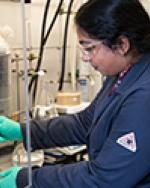
My advice for students would be to not be shy, and take the leap! You only have 4 years in undergrad – if you want to do research, email every professor who has a lab for an opportunity to tour their lab, shadow undergraduate researchers in the lab, and even get yourself a research position!
Please give a brief, simplified overview of your research project.
We are interested in the fundamental question of how and why boronic acids work. Specifically, we want to investigate the mechanisms of saccharide binding. However, there are some fundamental aspects of how boronic acids bind to diols that those not familiar with the detailed mechanistic studies often overlook. The pHs at which the boronic acids bind to diols currently have conflicting reports in the literature. We plan to elucidate the binding constants and pH dependencies with a series of commonly used boronic acids with various diols. This fundamental study will become the foundation for future work that clearly determines the pH for each boronic acid to bind.
Describe the tasks you engage in as part of your work.
I do a lot of 11B NMR Spectroscopy, as well as making the reagents required for this project. Additionally, I do thorough literature as well as present mock lectures to my lab group on concepts necessary to understand more about this research. Over the summer I made ligands that participate in the click reaction necessary for this project!
Describe what you thought college might be like before you came to UT. Did you consider research when thinking about college?
I thought college was going to be a lot like high school; I knew going in that I wanted to pursue an MD/Ph.D. after undergrad but never imagined the path that I took at UT as a means to my goals. I wanted to do biochemistry research coming in, but I found that research in organic chemistry is so versatile and applicable to so many fields, including medicine.
How did you get involved with your research project?
I got involved through Dr. Anslyn’s HHMI-Translational Research Initiative Program; this program introduces students to research and life in academia, with hopes to shape future professors.
Do you see your project connecting with your plans for your future?
Yes! My research is directly applicable to potential drug development for diabetes.
What is the most interesting or surprising thing you’ve gotten to do for this project?
This project gave me the confidence to apply to the Undergraduate Research Fellowship. I was honored to be one of the recipients last year! Lab-wise, one of the coolest pieces of machinery I’ve worked with is called the Rotor Evaporator (rotovap) – it’s used to remove solvents from samples gently via evaporation.

